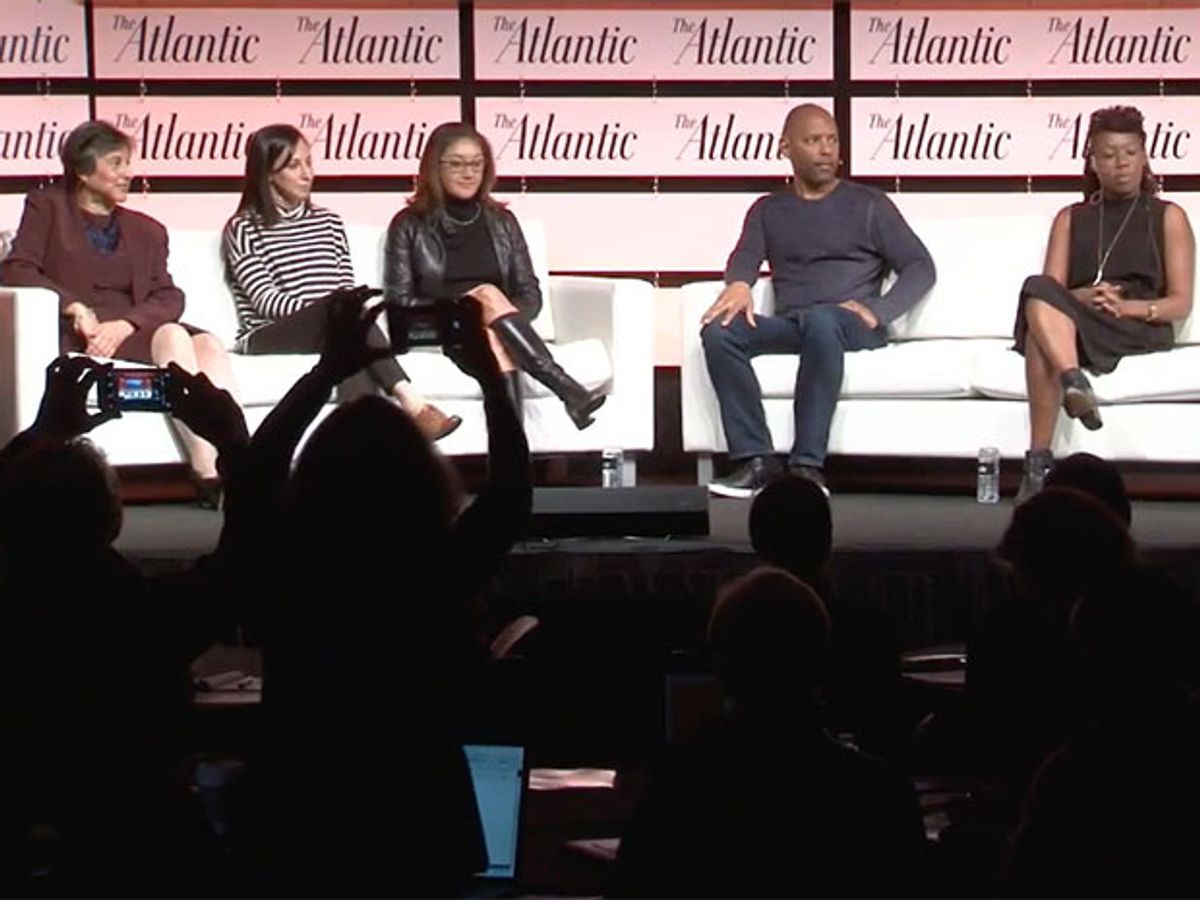Three years ago, a software engineer at Pinterest, Tracy Chou, wrote a blog post calling for companies to release stats about the number of women in their tech workforces. Two years ago, thanks to the pressure that post generated, companies started releasing stats about workplace diversity—not just about gender diversity, but about racial diversity as well.
The data showed that tech companies were dramatically white and male, particularly in the upper ranks. And the biggest companies, at least, set out to do something about it
Last week, Atlantic Magazine brought together tech executives, local community leaders, venture capitalists, journalists, human resource specialists, and others to discuss diversity efforts. The discussion at Inclusion in Silicon Valley, at times, was refreshingly blunt. An early comment set that tone:
Leslie Miley, director of engineering at Slack, looking at investments tech companies make in Asia and India, and the investments they are not making in U.S. communities, said it, “shows that Silicon Valley is hostile to a certain kind of diversity. You come to Silicon Valley and you don’t see people that look like me in positions of power (Miley is black). If that’s not hostile, what is?”
Anthony Heckman, an associate at Kapor Capital, pointed out: “It’s not a diversity problem, it’s an exclusion problem. Blacks and women have been excluded, particularly from higher ranks. We have people from Turkey and France, but not Oakland.”
“Is it easier for this industry to find top folks from Mumbai than to create a pathway for kids from Oakland?” asked a member of the audience. Vayable founder and CEO answered in one word: “Yes”
The lack of diversity stems from hidden and systemic bias, believes Monique Woodard, a partner in 500 startups. “If you turned off the imported talent, would you look to Oakland and Atlanta? I’m not sure people would,” she said.
What the diversity problem isn’t about, many agreed, is the pipeline. “Largely the pipeline answer is a bit of a myth,” Woodard said. “There are large numbers of minority and women engineering professionals coming out of school every year. But where are you going to find them? Howard University? Hampton University?” Silicon Valley companies aren’t recruiting at those schools, and as a result, she said, those graduates “are going to government jobs, large national organizations—they aren’t coming to tech, to startups.”
“The pipeline is part of it,” said Y-Vonne Hutchinson, co-founder of Project Include. “But it is also what is happening inside of the company. What if a resume is from ‘Lakisha’? What if someone comes in wearing a suit because they want to impress—not a blazer and jeans—and that works against the candidate?”
Changing the practices that perpetuate the overwhelmingly white and male character of the Silicon Valley workforce are not going to be easy, the conference discussions made clear, because these practices have become so ingrained in the culture.
“I’ll call out Google and Facebook,” said Miley. “They created this culture where people are expected to come from a certain school and have a certain background. They’ve spun out hundreds of companies that have taken this model and run with it.”
“Many tech companies, Google included, have had an elitist approach, just going to top schools in country,” said Google vice president of people operations, Nancy Lee. Lee pointed out that Google recently widened its net, expanding recruitment to 300 campuses, up from 70. “That population [currently being recruited by tech firms] tends to be very homogenous.”
“I don’t think it’s about ill intent,” said Devin Wenig, CEO of eBay. “I have found strong inertia, that, at its worse, can be a bro culture, [the attitude that] ‘I’ve worked my entire life with young white engineers and they are good, that’s what I know, and I’m going to keep doing it.’”
“There is also the culture of genius, where we think some people are natural leaders, or have a technical mind,” pointed out Carissa Romero, a partner at Paradigm, a consulting firm that focuses on diversity issues. “When companies have that mindset, it leads to more stereotyping, because stereotyping is about fixed abilities.”
The lack of diversity in the venture capital industry, speakers suggested, is also holding inclusion at tech companies back.
“Venture capital comes out of finance,” said Woodard. “If you look at other areas of finance, they tend to be very white. It is also network and relationship driven—you hire an associate of whom you know. You know a guy—and it is always a guy—whose son wants to be a VC and you hire him as an associate.”
Many of the speakers indicated that the only way to seriously improve the inclusion of women and minorities in the tech workforce is to demonstrate that such inclusion benefits companies economically. Jonathan Williams, director of regional public affairs at Intel, said: “We did an economic impact study to try to quantify impact of full diversification [and] concluded that it would lead to a 1 percent increase in U.S. GDP. That’s a neat story that is under-told.”
“As the U.S. becomes browner, less white; as it becomes a majority minority nation, you can’t then say we are going to keep doing what we have always done,” said 500 Startups’ Woodard. “As economic and demographic shifts happen, what has always worked will no longer work. You have to speak to people’s pockets, and missing out on revenue speaks.”
EBay’s Wenig concurred that it’s about the bottom line. “If I don’t create an environment where best black, women, Hispanic engineers want to come to eBay, we’re not going to win in the talent war,” he said. “We have gotten people who otherwise would have gone to a sexy startup because they think we do get it. It is all about the talent war.”
Where does the tech industry go from here to fix the problem? They aren’t exactly sure. Said Wenig, “Companies, CEOs, and leaders are looking for help. They want advice, they want help; they believe in this, they want to make progress, but are struggling with how to make progress. Practical advice is welcomed.”
Tekla S. Perry is a senior editor at IEEE Spectrum. Based in Palo Alto, Calif., she's been covering the people, companies, and technology that make Silicon Valley a special place for more than 40 years. An IEEE member, she holds a bachelor's degree in journalism from Michigan State University.



